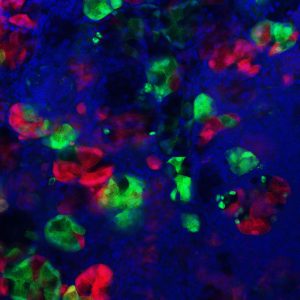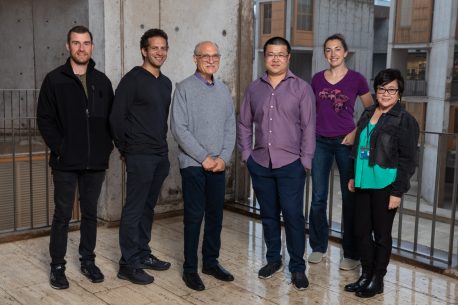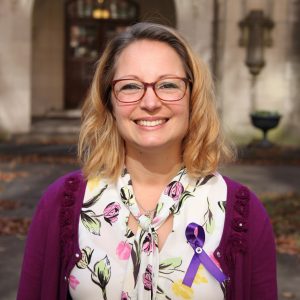
October 29, 2021

LA JOLLA—Scientists at the Salk Institute and Vanderbilt University School of Medicine Basic Sciences have found that cells in the pancreas form new cell types to mitigate injury, but are then susceptible to cancerous mutations. The research, led by Salk Professor Geoffrey Wahl and Vanderbilt Assistant Professor Kathy DelGiorno, former staff scientist in the Wahl lab, was published in the journal Gastroenterology on October 22, 2021.
The findings establish a “better understanding of the mechanisms of healing in the pancreas and when these processes go awry,” says DelGiorno.
The team used a multidisciplinary approach that combined RNA sequencing, imaging techniques, genetically engineered models and human samples to identify the cell types that form in response to pancreatic injury. From this approach, “we compared our dataset to published datasets of gastric injury, oncogene-induced pancreatic neoplasia, and human pancreatitis to identify conserved processes across species and organ systems,” says DelGiorno.
The findings of this paper “support our long-held thesis that tissue inflammation causes cells to reprogram to a more primitive, developmentally plastic state that under normal circumstances contributes to tissue repair. When subverted by oncogenes like RAS in pancreas cancer, it causes one of the most incalcitrant cancers known to medical science,” says Wahl, holder of the Daniel and Martina Lewis Chair.

Pancreatic cancer is a major public health burden and is slated to become the second-leading cause of cancer-related deaths in the United States by the year 2030. Currently, the average five-year survival rate for pancreatic cancer is only 10 percent, one of the worst of any cancer type. New and innovative treatments are greatly needed to change these outcomes for pancreatic cancer patients.
“Our work captured how these acinar cells change in response to injury with incredible resolution. We’ve been able to identify multiple diverse cells generated by the acinar cells and uncover where they came from. Our findings provide a valuable resource to the field of pancreatic cancer research for understanding the processes that happen early in pancreas injury and tumorigenesis,” says first author Zhibo Ma, postdoctoral fellow in the Wahl lab.

“We hope to co-opt and/or target these processes for the benefit of patients needing treatment for pancreatitis and cancer,” says DelGiorno. The Vanderbilt team has received a National Institute of General Medical Sciences Maximizing Investigators’ Research Award to follow up on this work. “We will be using genetically engineered models to study the lineage trajectories and functional role of the cell types identified in this study,” says DelGiorno. “We will identify the physiological role of these cell types in pancreatic injury, regeneration, and tumorigenesis.”
This research was funded by Linda’s Hope Fund for Pancreatic Cancer Research, the National Institutes of Health, the Hope Funds for Cancer Research, the Sky Foundation, the Chapman Foundation, the Waitt Foundation, the Chan-Zuckerberg Initiative, the National Science Foundation, the Nikki Mitchell Foundation Pancreas Club, the Department of Veterans Affairs, Cancer UK, the Isacoff Gastrointestinal Research Foundation, the Freeberg Foundation, the Leona M. and the Harry B. Helmsley Charitable Trust, the American Gastroenterological Association and additional Vanderbilt and Salk institutional funds.
Posted courtesy of Vanderbilt University’s School of Medicine Basic Sciences.
About Vanderbilt University
Top-ranked in both academics and financial aid, Vanderbilt is committed to the strength of its interdisciplinary research enterprise and to inclusive excellence, believing that profound breakthroughs happen when scholars of different perspectives, races, gender identities, ethnicities and socioeconomic backgrounds work together.
DOI: 10.1101/2021.04.09.439243
JOURNAL
Gastroenterology
AUTHORS
Zhibo Ma, Nikki K. Lytle, Bob Chen, Nidhi Jyotsana, Sammy Weiser Novak, Charles J. Cho, Leah Caplan, Olivia Ben-Levy, Abigail C. Neininger, Dylan T. Burnette, Vincent Q. Trinh, Marcus C.B. Tan, Emilee A. Patterson, Rafael Arrojo e Drigo, Rajshekhar R. Giraddi, Cynthia Ramos, Anna L. Means, Ichiro Matsumoto, Uri Manor, Jason C. Mills, James R. Goldenring, Ken S. Lau, Geoffrey M. Wahl and Kathleen E. DelGiorno.
Office of Communications
Tel: (858) 453-4100
press@salk.edu
Unlocking the secrets of life itself is the driving force behind the Salk Institute. Our team of world-class, award-winning scientists pushes the boundaries of knowledge in areas such as neuroscience, cancer research, aging, immunobiology, plant biology, computational biology and more. Founded by Jonas Salk, developer of the first safe and effective polio vaccine, the Institute is an independent, nonprofit research organization and architectural landmark: small by choice, intimate by nature, and fearless in the face of any challenge.